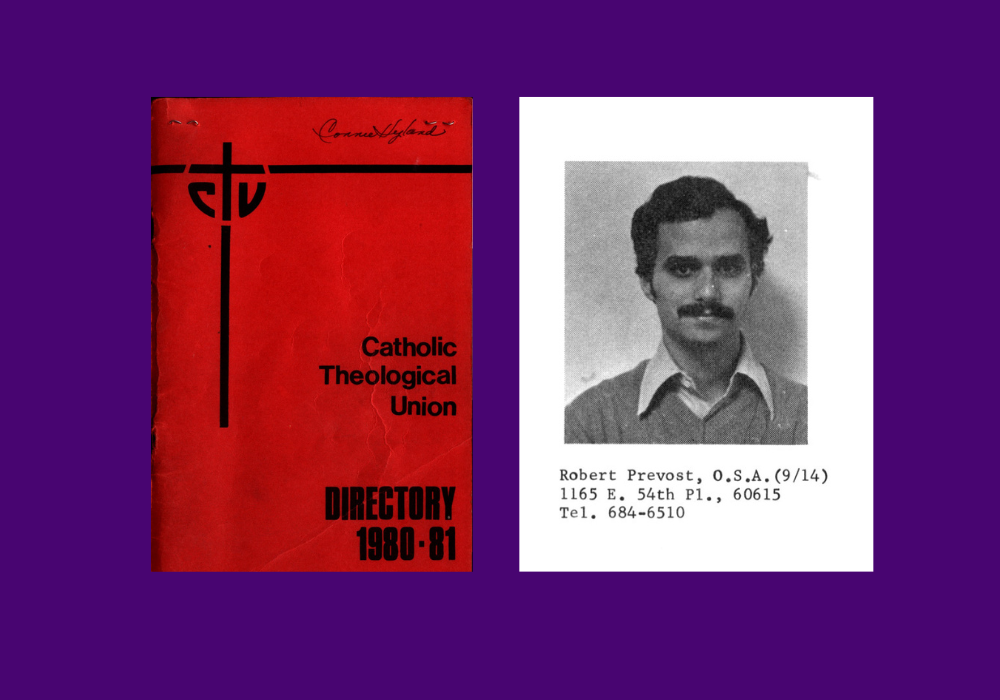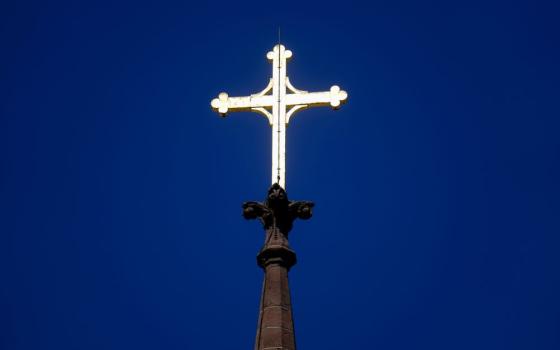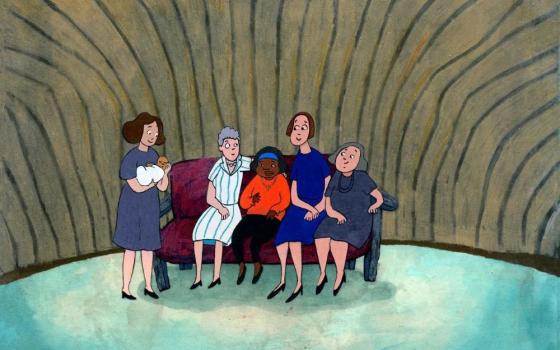
A photo of then student Robert Prevost from the 1978-79 student directory of the Catholic Theological Union in Chicago; cover of the 1980-81 CTU student directory (Courtesy of CTU)
Sr. Dianne Bergant, a member of the Sisters St. Agnes of Fond du Lac, Wisconsin, enjoyed an acclaimed 45-year career on the faculty of Catholic Theological Union in Chicago, where she is now distinguished professor emerita of Old Testament studies.
But in the last month, Bergant has drawn further attention as a professor who taught Pope Leo XIV, then Robert Prevost.
Prevost was one of thousands of students Bergant taught during her time at CTU (1978-2023) but one she had stayed in touch with periodically, even after Prevost was named cardinal in 2023.
Bergant focused on the historical-critical method, with an emphasis on literary and cultural issues and drawing interpretation into the contemporary world. That involved engagement with different ways of approaching biblical texts, such as feminist interpretation or in dialogue, as a Christian scholar, with Jewish scholars.
"I think anything that broadens your perspective is a good experience," she said.
Sr. Dianne Bergant taught Pope XIV, then Robert Prevost, at Catholic Theological Union. (Courtesy of CTU)
To set the context for knowing Robert Prevost, who graduated with a master of divinity in 1982, what do we need to know about CTU in those days?
CTU nurtured community, whether male or female. We called people by their given names, not by their titles, whether that be sister or professor or doctor or father, whatever. We prayed together. We had parties together. You got to know students more than just in the classroom. So, you kept contact. Members of the community that I had in class would come back for someone's ordination.
Though Robert was down in Peru for 10 years initially, if he came back for an ordination, I would see him at the ordination. In fact, the last time I saw him was at a 2016 ordination. … We embraced; this is a warm man, an open man.
What are your memories of Bob Prevost as a student?
His first year he took introduction to the Old Testament, and his third year he took Pentateuch (the first five books of the Hebrew Scriptures) and he did good work in both classes. … He was an A student. … I can say that he was a reliable student.
When he was named cardinal, I sent him an email. I told him something about how important students were to me. And I always felt that my work at CTU was a great privilege to be part of the formation of the future ministers of the church. I thanked him for his commitment to ministry that caught the eye of Pope Francis.
The very next day, I got an answer back. He spoke about his formation briefly, and he thanked me for being part of it. That says something about him. He signed it "Fraternally, Bob."
Did you expose him to any of the new ways of approaching texts, such as feminist hermeneutics?
That was very much a part of it. I introduced those things because it was very much a part of what we were doing in theology at the time.
Were you surprised when you learned he had been elected pope?
I was surprised not because I didn't think he could do it. All you had to do was look at his resume, which showed he was equipped. But like everybody else, I didn't think it was going to be an American.
Even now, I don't know how to describe my feelings. I was just overwhelmed. I cannot describe it. And after several weeks, he looks to be perfect for the job.
Advertisement
Was there something that you tried to impart to your students, including Bob Prevost, about reading biblical texts?
I said at the beginning of my classes that what goes on in this class is not simply reading, writing and listening. I quoted a passage from Paul in 1 Corinthians (15:3), in which Paul says, [to paraphrase,] "I hand down to you" — he is talking about Eucharist. I hand down to you what was also handed down to me that the night before he died, the Lord Jesus. And I said to my students, I hand down to you what was handed down to me so that you can hand it down to others.
I told them: This is not simply a class. This is the handing down of the tradition.
Why is that important?
The people of God deserve the best that you can give them. That's why you're going to work hard in this class, I said, not because I'm a hard teacher, not because it's hard material, but because the people of God deserve the best that you can give them, and they haven't always gotten it from us.
So I tried to make them realize what's going on here is literally the handing down and the reshaping of the religious tradition. We're not playing games here.
Sisters say one thing they really like about Pope Leo is that, as an Augustinian, he understands community life. Do you think that will help him in his relations with sisters?
That will help him with relations with any kind of people. It helped him with his relationship with the other bishops and cardinals.
There are some sisters who will kiss his ring, and that's wonderful. And there are other sisters who will expect that he be a feminist, and that's wonderful. So some will be pleased with him and some will not be pleased with him.
He was pope only one day, and I read that there were people who were already unhappy, saying he was not stronger in his support of women's ordination. And my response to that was, first of all, give him a little bit of time!
But it's my understanding that the first Mass that he had, a woman did one of the readings. So he's opening up some ministry.
Is there a particular thing you would like to see him do in terms of the role of women in the church?
I'm glad you say the role of women in the church. I do not believe you start with ordination.
But a lot of people want ordination of women right away. I think Francis began, and Leo will continue, involving women, such as participating in the liturgy. Francis put women in the Curia. They're working in dicasteries. They're part of the structure of the church. And it would seem to me that Leo will continue that.
I'm not pushing for [ordination of women] myself. The reasons given that women, or the main reason given, that women cannot be ordained are specious. But we've never done it that way. And yet the church has always changed. So the church could change.
But before women are going to be ordained, married men will be ordained. Because married men [former Anglican priests and Eastern rite priests] are already ordained. We already have a married priesthood.
What about women deacons? Is that also a possible step?
It would seem to me that would precede ordination.
You must be like any teacher who sees a successful student. You must be proud at this moment.
I am. Yes. I really do believe that I've been involved in his formation. Now, I can't pick out specifics, but what a great privilege it has been. I'm very proud of that personally.
You're right to say he's "done good."
But a lot of others have as well. At CTU, in the pictorial directory for the year '78-79, on the same page as Bob Prevost is the picture of Comboni missionary Ezechiele Ramin. He was killed as a missionary in Brazil. His cause is up for canonization. He was also a student of mine.
And then there are students who have not died but who have served. So how proud I am that I have furthered the ministry with my teaching. And there have been others. Only one pope so far, only one martyr.
It sounds like what you're saying is that you are very proud of Robert Prevost, but given the other students you've had, you don't have a hierarchy of being proud.
I don't. Some are recognized and some are not.
Did you send the pope an email after he was elected?
I did. In the email that I sent to him when he was named cardinal, I began by saying, what do you say to a cardinal? How do you address a cardinal? When he was elected pope, I said to him, if I don't know how to address a cardinal, how do I address a pope?
It was very brief, because I thought, of all the millions of people, I am not foolish to think that this email is going to be held up in any way. But I did say to him that I joined the rest of the church in promising prayer for you every day.
How did he respond?
Very simply. I don't know if he did it or if at this particular point he already has people who do it for him. But he said something in there that indicated to me that he knew or, whoever responded, knew what I had written.
He responded, "Best wishes, Leo XIV."





